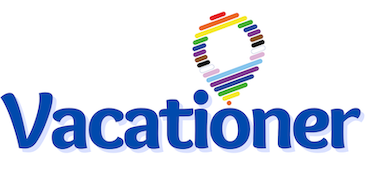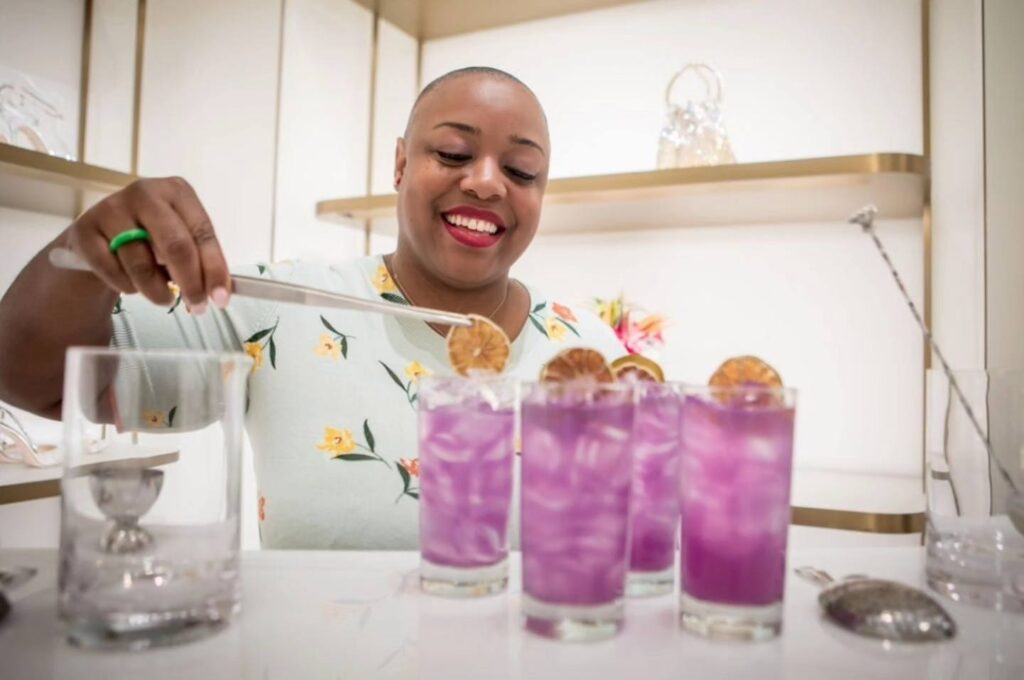Mixing It Up in Atlanta with Tiffanie ‘The Drinking Coach’ Barriere
If you enjoy a good handcraft cocktail and want to understand what makes a good mixed drink; then let us formally introduce you to Tiffanie Barriere, an Atlanta-based spirit educator and consultant. Known as “The Drinking Coach,” the 43-years-young lesbian bartender has appeared as a guest judge on Drink Masters, and a consulting mixologist on High on the Hog. Both TV series are currently streaming on Netflix.
In a more intimate setting, Barriere flexes her skills through her hosted cocktail classes that are “historically rich experiences” for people who want to learn how to make a proper cocktail at home. She’s been showered with many accolades, including the Tastemaker of the South Award, and she is also a member of the James Beard Beverage Advisory Board and Atlanta Chapter of Les Dames d’Escoffier, a philanthropic organization of women leaders in the food, beverage, and hospitality industries.
We caught up with Barriere to ask her about the start of her incredible career, the connection between Black history and drink culture, queer spaces during the Harlem Renaissance, and Black and queer-owned businesses to support when visiting Atlanta. She also spills a few details about a new book project!
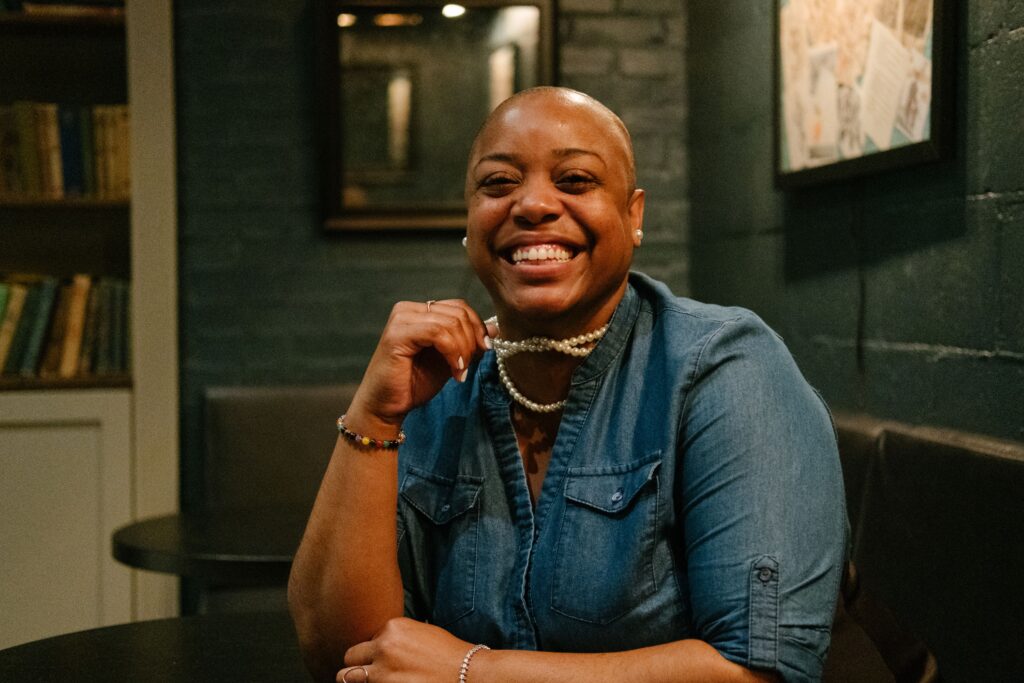
Kwin Mosby: You call yourself “The Drinking Coach.” What does that mean to you?
Tiffanie Barriere, The Drinking Coach: It means so much. I’m a bartender by trade and bartended pretty much my entire life before I was getting paid to do it. I bartended at home and had a big drinking family, so that was my chore – to make drinks around the house. Once I got into the profession, of course, I loved it!
I saw that there was a huge hole in the [food and beverage] industry for education from the consumer side and the bartender side. I was the one to always coach people into understanding their palate and understanding what they want. As a drinking coach, I’m basically just being your friend and coaching you through all the things you need, along with adding storytelling and cultural appreciation to spirits and cocktails.
Where did your fascination for cocktails and mixology come from?
Yeah, great question. My passion for cocktails started at home with the women in my family. It was so much fun when it was time to drink. I love seeing them laugh and play games and dance and just loosen up. And so I was in love and just so enamored by what was going on in that cup because the energy shifted every time they drank from it. So I was intrigued and curious very early. And just seeing, you know, the communal aspect of what drinking did is very celebratory, and it was very loving.
That’s what really started it and then I found out it was a real job and then it was a real, real job and I’m like, “Okay, this is a real thing!” People have always connected bartending to the in-between job, the college job, you know? They don’t take it seriously, but once I got a hold of my flow and my space – it was official!
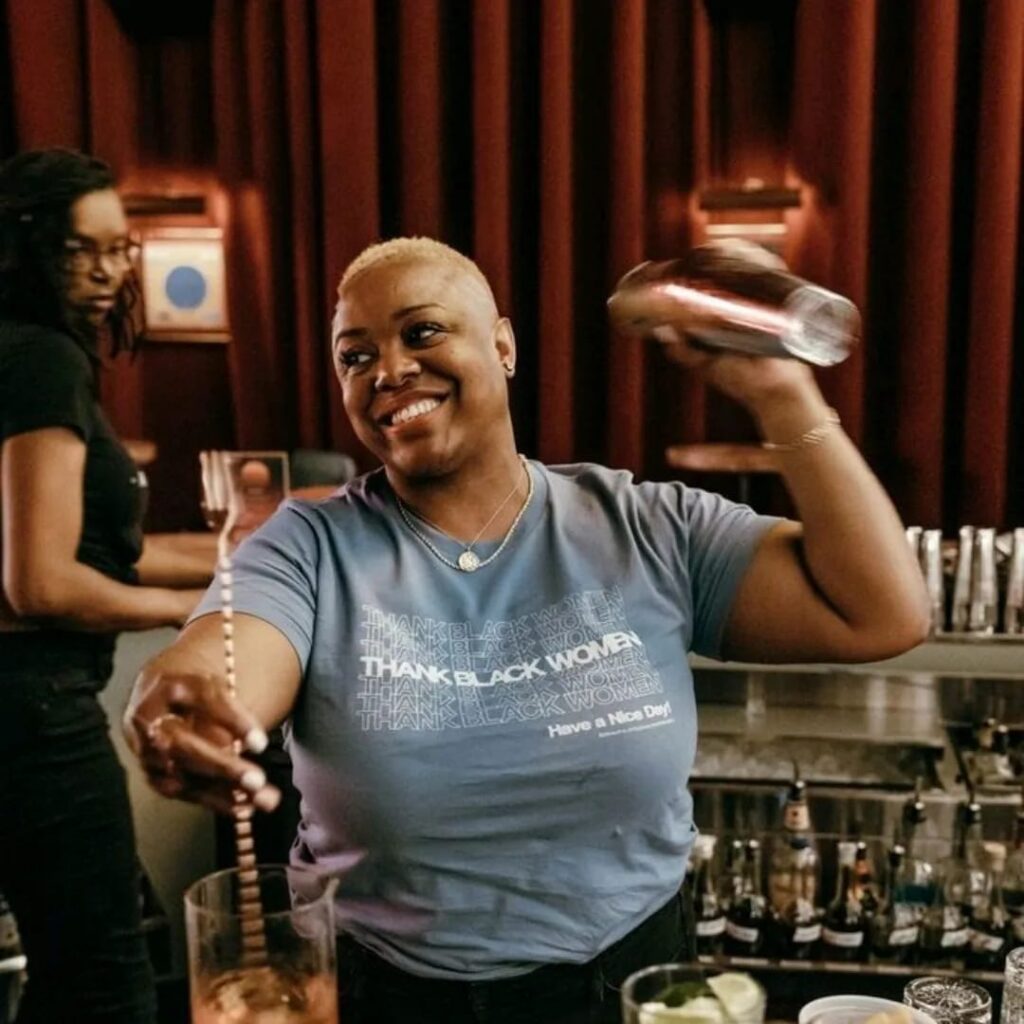
We’re you guided or inspired by other Black Queer women?
It wasn’t a Black Queer woman, but a white Queer woman, Ria Pell, who passed in 2013. She was a “butch,” bold, and beautiful chef here in Atlanta. She would come to sit in my bar and hang out with me. People noticed that I hung around lesbians and would ask me, “Is that who you hang around with?” The openness and the freedom of the masculine women and the people who identified as “butch” was/is just so my vibe. And she would uplift me and make me feel so safe.
You host mixology classes around the US. Can you kind of explain what your classes entail and what should a newbie understand when walking out of one of those classes?
Yeah, I love hosting classes. I love making new best friends in about an hour. So classes with me are an hour maybe an hour-and-a-half sessions. We do two or three tailor-made cocktails. It’s really up to whatever the client wants. If we want to talk wine or whiskey, tequila, whatnot; we’re going to taste it in its purest form, understand the spirit, where did it come from, give some indigenous background and storytelling to it, and honor the spirit. All the spirits are made from some background; we just didn’t start making booze. So I love giving the story connected to said spirit, whether it’s black or brown or white, I want to talk about it.
And then we make drinks, we talk techniques, how to shake, and why we use specific types of ice, sweet to sour, and all those things. And when we are done, the goal is a few things. Hopefully, you leave feeling excited and more welcoming to beverages, whether it’s zero proof or not, but just more welcoming to flavor and understanding why you like things and why you don’t.
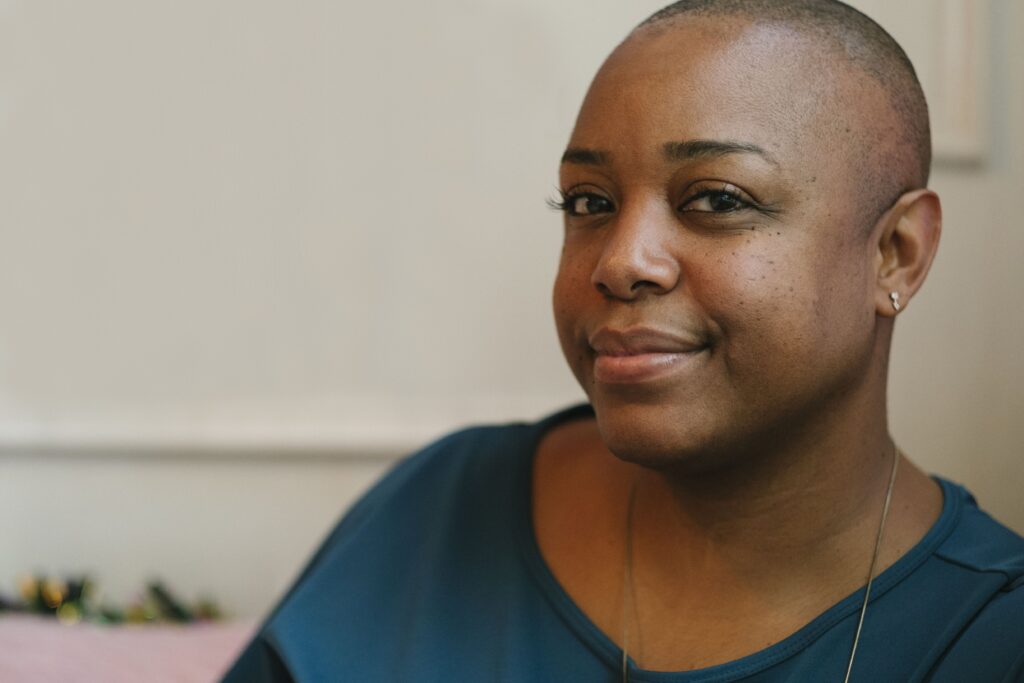
On the Netflix series High on the Hog, there’s a scene where you, Stephen Satterfield, and Karl Franz Williams (owner of 67 Orange Street), talk at length about important Black folks like Tom Bullock, the first African-American to write a cocktail book “The Ideal Bartender” in 1917. Are there other important people or ways that Black and or queer folx played an important role in drink culture?
Yeah, Tom is cool. We love Tom. He’s like our godfather in spirits. There’s another cocktail book that comes out a few years after that from Julian Anderson, the second Black man that we see write a cocktail book (“Julien’s Recipes”). But there was a woman a few years before that. Atholene Peyton authored a recipe book that shared bartending techniques. Her collection, “The Peytonia Cookbook,” was published in 1906. Bullock and Anderson’s books are 1917 and 1919.
In addition to those books, there are Black cookbooks that were created by in-house help, and in the back of those books there were cocktails because you cooked and you made drinks, you made punches and things like that.
So, there’s this like ‘infection’ of drink culture from slavery. I mean, you already know. We did a lot of things, but we also did a lot of things in bondage. We served, we served a lot of things and we created and invented a lot of things. So, the connection to our natural culinary and beverage creation – that’s what we’ve done for survival and that’s what we’ve done in service for centuries. So I think that era, I mean, it’s a very tough time, but we were feeding and nurturing our bodies with some great things.
The Queer side, you know, I just give the Harlem Renaissance such a shout-out because these speakeasies, rent parties, and incredible connections in the 20s after the war (World War II) were so powerful, sexy, and elegant. We’re seeing our literary and music folks from Langston Hughes to Coltrane in these exclusive spaces that are not only allowing us to drink and be who we are, but we’re also seeing a lot of queer hidden parties. Queer life has been around forever, but in this particular time, you’re seeing, the drag scene and entertainment scene come in. And you’re seeing culture look good in the queer space, but it was our secret.
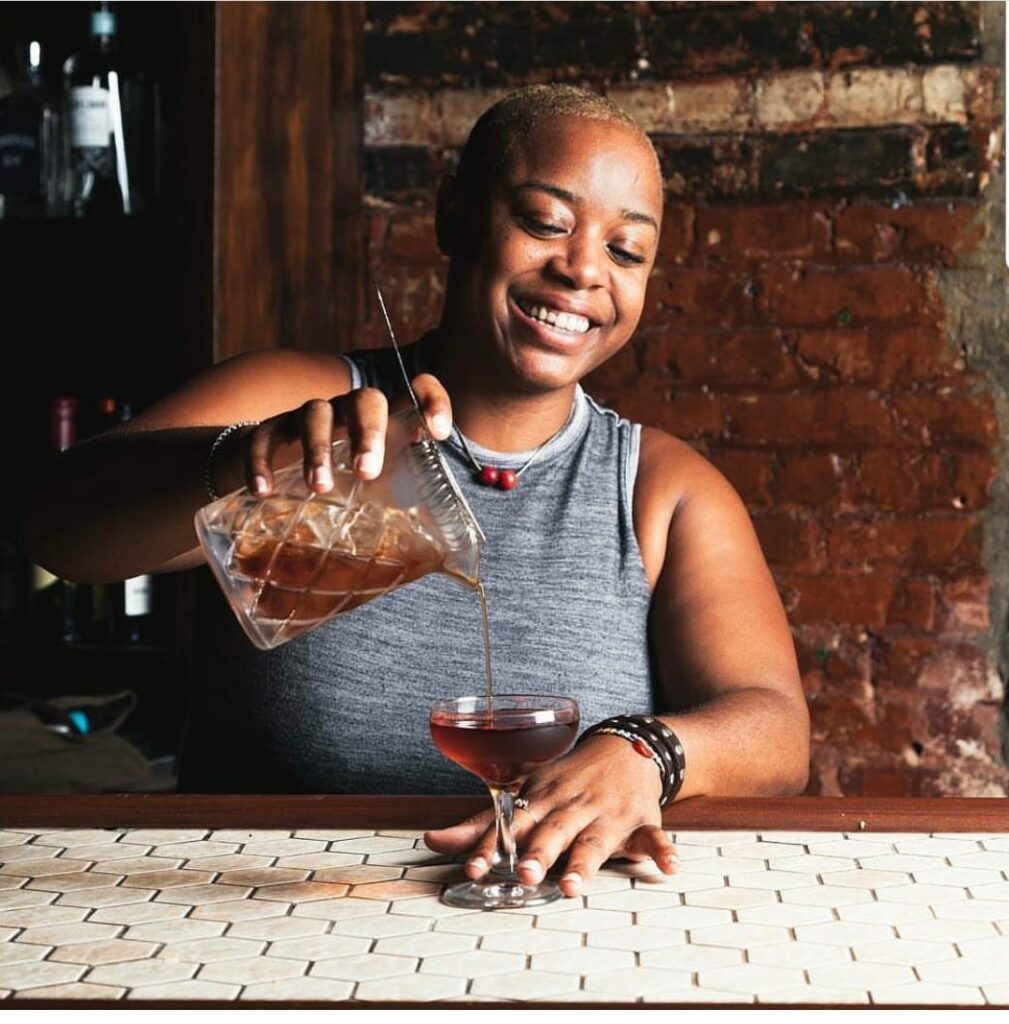
You’ve made hundreds if not thousands of cocktails. So, what are your favorite cocktails to make?
Sheesh, everything! I drink it all. I’m a sucker for a martini. No lie. My partner loves making them for me. That’s the first cocktail she learned to make to get me going. But I love a martini clean – stirred, boozy, and cold. I don’t need anything except the gin, so I love drinking and making martinis. The same goes for an old-fashioned they never get old… pun intended. I love a boozy cocktail. I love spirit-forward.
I’m not a fan of anything sweet. I don’t like desserts, but I like the components that come in. Whiskey, rum, tequila, and gin are my favorites. My old-fashioneds can range from a whiskey old-fashioned to a rum old-fashioned to mezcal old-fashioned.
I love a good cocktail, too. So, are there specific Black-owned or Queer-owned watering holes that you think people – regardless of how they identify – should check out when visiting Atlanta?
Yeah, I mean we have a few. There’s something to be said about queer spaces that are owned. They come across in a clubby way, but they’re not always that way. We have the lesbian-owned JenChan restaurant that’s on the east side. It’s great! We love Campagnolo, which serves Italian food but it’s gay as hell.
We have the VanTrece Restaurant Group. A good friend of mine, Chef Deborah VanTrece, owns three restaurants – Twisted Soul Cookhouse & Pours, Oreatha’s at The Point, and La Panarda – in the city with her wife. There are a couple of cool chefs that are queer in Atlanta, but those are my top hot spots.
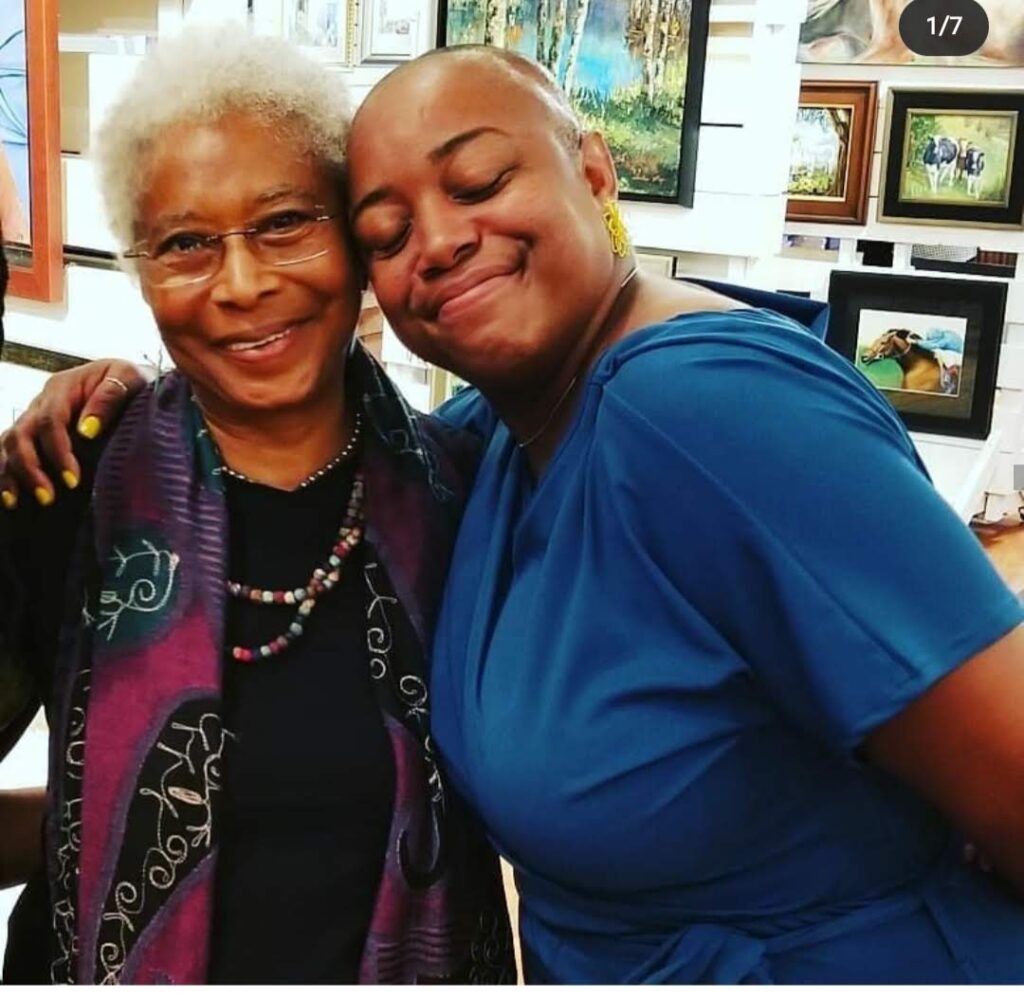
Taking a look at the span or breadth of your career, what would you say is your proudest moment?
Okay, my proudest moment…I research a lot and I read a lot about Black history and culture. I get in my head, and I get so frustrated and emotional because Black history is just not archived enough, and white folks wrote our history. We don’t even know how true some of the stuff is. So, I’m always deep diving into books and records and all the shits.
Last year, the Smithsonian did a virtual event, a collaborative event with Wikipedia and the National Women’s History Museum. It was about Black women in culinary and how these women have done so many things, yet they’re not archived. They’re not, you know, seen in the right light. And if it’s so, it’s in small articles.
So, Wikipedia created a Wiki page for me live, like on the virtual, with my little life and a photo of me and just put me down in history. The things that they were saying about me made me so proud. I was like that’s me and I’m a part of history. I’m a part of women’s history and food and beverage, and I’m representing all day. I cried all night because I couldn’t believe that I was noted by the Smithsonian, the National Women’s History Museum, and Wikipedia. So, getting a Wiki page – I know a lot of people have them – but I was really proud of that moment.
We have Ancestry.com and 23andMe right now. You can just put my name in … and there we go! My father has passed now but my mom and my grandma and my family … if anyone wants to look me up later on – 50 or 100 years from now – they’ll know there was a girl named “The Drinking Coach” out here daydreaming, trying her little heart out, and doing it, and I want to be known for that.
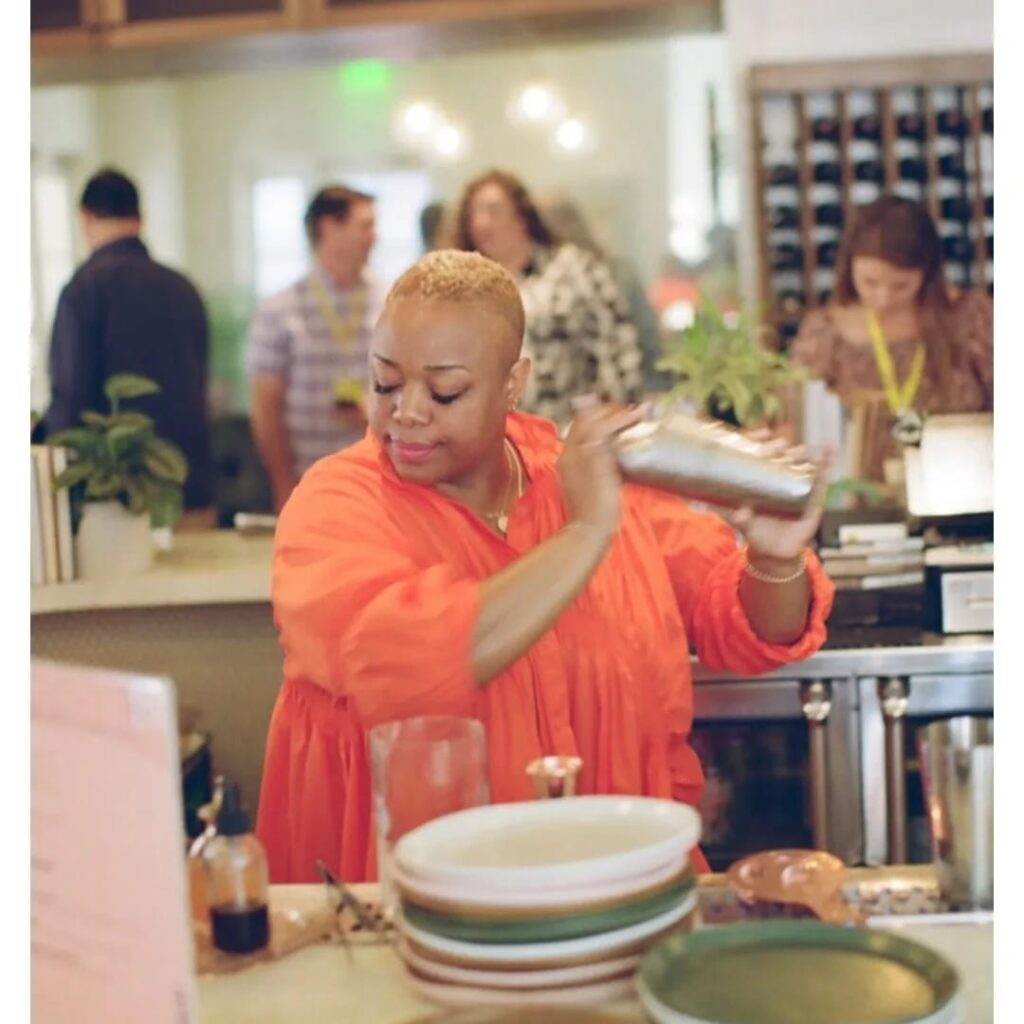
Do you have any cool upcoming projects that you’d like to mention before I let you go?
I’m writing a book y’all. It’s happening. It’s a cocktail book. It’s about color. All the things connected to color as far as my color and all the things connected to queer representation.
I’m loving it already.
That’s the sneaky peek of it. I’ve been sitting on this book idea for years and I finally got the right people in place. I assisted with Tony Tipton Martin’s last book, “Juke Joints, Jazz Clubs & Juice.” I am ready. We are a few months away from sending everything in.
Do you have a scheduled date for the book’s release?
I don’t. Everybody wants to know. This is a process, but we’re looking at next Spring.
That’s really exciting.
I’m so excited. I can’t wait for y’all to get this book in your hands! I just want to express my love for not only cocktails but my love for color … pun intended. I’ve loved the rainbow my entire life. I just happen to be gay. [laughs] I mean, just there’s so many things around the word color and there’s so much energy that comes from it. And this book will express that through cocktails.
Well, you’ll have at least one person who will buy it. Your book sounds like it’s right up my alley.
It’s going to be fun. I promise you.
Well, Tiffanie, I wish luck on the book, and again, I appreciate you talking to me.
Thanks for considering me. This is great!
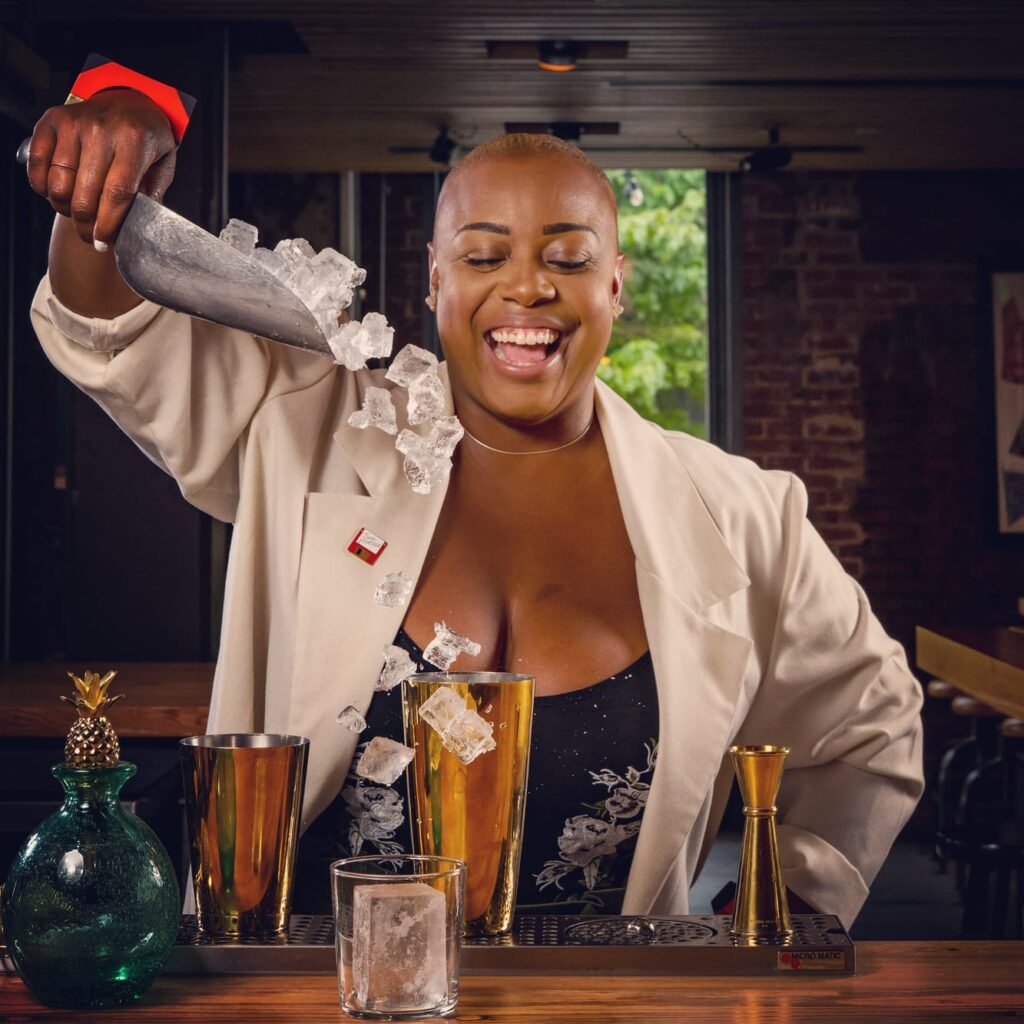
You probably won’t catch Tiffanie Barriere regularly serving up drinks at a local bar in ATL, but if you want to know more about “The Drinking Coach,” visit her website or follow her on Facebook, Instagram, or X (Twitter).
